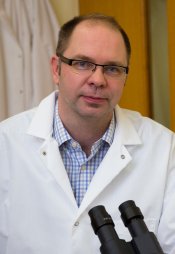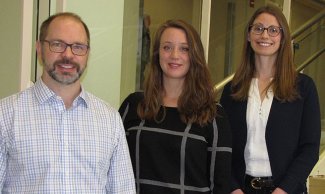
The National Institutes of Health will fund work in the newly created Center of Biomedical Research Excellence through a $10.9 million, five-year federal grant. Led by Adam Hoppe, professor of chemistry and biochemistry, the center aims to expand existing partnerships with South Dakota School of Mines and Technology and the Biomedical Research Infrastructure Network at the University of South Dakota.
In addition to funding the research of current faculty members, the grant will bring on new researchers and staff and add equipment to allow for more sophisticated research. The new center is a continuation of the South Dakota BioSystems Networks and Translational Research center that was created in 2013, when the state awarded the center $12 million over six years. That funding ended in 2018, but smaller grants and university investment kept the work active.
The NIH award will help to advance the work of junior researchers to the level they can receive sustained funding from the organization and the National Science Foundation.
Natalie Thiex, an associate professor in the biology and microbiology department as well as the chemistry and biochemistry department, is one of two researchers identified in the proposal. Her work focuses on macrophages, white blood cells that go to work to help repair and heal a wound.

“Macrophages are consistently cleaning debris out of the tissue and are the most important cell in regulating inflammatory response,” according to Hoppe. He also noted there is a balance between activating inflammation to begin the healing process and resolving inflammation, which, when unchecked, increases the risk for various diseases.
Darci Fink, also an associate professor in the biology and microbiology department as well as the chemistry and biochemistry department, studies lymphatics and the formation of lymphatic vessels. The lymphatic system is a network of vessels and organs that regulates the amount of fluid in the human body and defends it against infections. According to Hoppe, the research is to determine how these cells grow and organize themselves into functional structures.
Republishing
You may republish SDSU News Center articles for free, online or in print. Questions? Contact us at sdsu.news@sdstate.edu or 605-688-6161.

